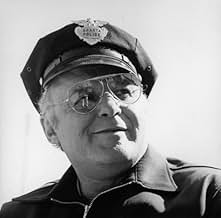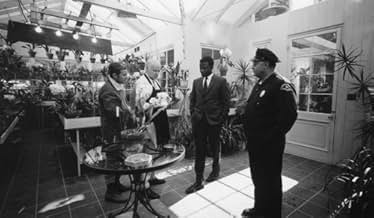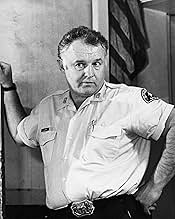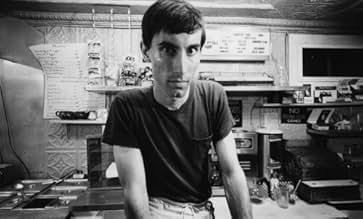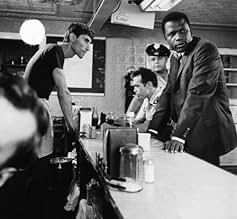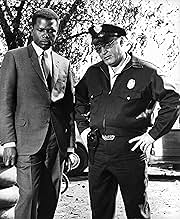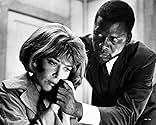A black Philadelphia police detective is mistakenly suspected of a local murder while passing through a racially hostile Mississippi town, and after being cleared is reluctantly asked by the... Read allA black Philadelphia police detective is mistakenly suspected of a local murder while passing through a racially hostile Mississippi town, and after being cleared is reluctantly asked by the police chief to investigate the case.A black Philadelphia police detective is mistakenly suspected of a local murder while passing through a racially hostile Mississippi town, and after being cleared is reluctantly asked by the police chief to investigate the case.
- Won 5 Oscars
- 23 wins & 16 nominations total
- McNeil
- (as William C. Watson)
- Director
- Writers
- All cast & crew
- Production, box office & more at IMDbPro
Featured reviews
The Growing Pains of the New South
Especially the Voting Rights Act. The town of Sparta, Mississippi where William Schallert was Mayor and Rod Steiger was sheriff now has a significant new voting population and blacks might be a majority in that county. But even if they aren't, they know have a voice in the electoral process. Someone like Steiger has to take that into account now. Of course some of his deputies might not yet be with the program which explains why when a murder/robbery is committed of a very prominent northern businessman, Warren Oates sees fit to roust Sidney Poitier who's an unfamiliar black face in that town.
What a surprise they all get when they find out he's a top Philadelphia, Pennsylvania homicide detective and when his identity is established, his boss in Philly offers his services.
Poitier and Steiger both have to work through their prejudices, how each sees the other to solve this mystery which writer Stirling Silliphant gives us several red herrings before we learn the truth. Though Steiger got the Oscar for Best Actor, it should really have been a joint award. Their conflict and growing respect for each other drives the film. Steiger needs his expertise and respects him for that and Poitier comes to respect Steiger for his honesty.
Norman Jewison got great performances from his stars and the supporting cast of whom Warren Oates as the dimwit redneck deputy really shines.
Though set in a very narrow period of our history, In the Heat of the Night holds up very well with some eternal truths in its story. And it's the story of times that were a changing as one spokesman of the sixties put it.
Through The Mississippi Darkness
Forty years after the film was made, the racial themes seem just a tad heavy-handed. Whites are always backward and racist. And Tibbs is smart, urbane, and sophisticated. But back in the 1960s, the filmmaker probably did need to be blunt. And the point is made that Blacks and Whites, working together, can accomplish worthy aims, even though old Black Joe is still pickin' cotton at the Endicott Cotton Company.
As a whodunit, the story is fairly good, convenient coincidences notwithstanding. The clue to the killer's identity is pleasantly subtle.
The film's cinematography and production design are terrific. Many scenes take place at night. And the opaque lighting makes for a moody, slightly dangerous look and feel. Loved how they photographed that train moving down the tracks in the Mississippi darkness, a metaphor related to the film's theme. And the sound of a train whistle adds to the mournful realism.
Interiors look authentic. The masking tape that covers rips in a big leather chair in Gillespie's shabby office is so true to life. A single white light bulb hangs down from the ceiling in a small neighborhood grocery store, where the shelves are filled with empty fruit jars. And that greasy spoon called Comptons reeks of 1960's Southern rural reality.
My only complaint with this film is the background music. Some of the jukebox songs are not consistent with the film's overall tone.
"In The Heat Of The Night" is a technically well made, and quite interesting, murder mystery. Yet, it will always be remembered, rightfully, as the film that offered hope of racial harmony, during a decade in which there was none. Its "Best Picture" Oscar award is thus explained.
Once timely, now timeless
As sheriff Bill Gillespie, Rod Steiger is superb in his Oscar winning role, and this film provides Sidney Poitier with some of his greatest screen moments, including his famous admonition to Steiger that became the title of the less impressive 1970 spin off: "They call me MISTER Tibbs!"
This is one of the few politically correct films to make its point without resorting to heavy-handed, sanctimonious preaching. Stirling Silliphant's Oscar winning screenplay never hits a false note, and the change that occurs in the relationship between the leading characters is subtle, and, therefore, believable. The two stars are ably supported by an outstanding cast of both veterans (Lee Grant, Warren Oates, Beah Richards) and newcomers (Scott Wilson, Quentin Dean, and the delightfully creepy Anthony James). The score by Quincy Jones, featuring Ray Charles' rendition of the title song, captures the proper mood throughout.
In a year when the odds-makers were predicting an Oscar victory for "Bonnie and Clyde" or "The Graduate," "In the Heat of the Night" surprised the prognosticators by taking the Best Picture prize and four other Oscars. Considering its theme of racial tolerance, it seemed an appropriate choice at an Oscar ceremony that was postponed following the assassination of Martin Luther King, Jr. The film's theme made it timely, but its artistry makes it timeless.
The Academy made the right choice.
Brian W. Fairbanks
A great whodunit with a unique setting.
Genuinely Shocking but no Surprise...
Oscars Best Picture Winners, Ranked
Oscars Best Picture Winners, Ranked
Did you know
- TriviaSidney Poitier insisted that the movie be filmed in the North because of an incident in which he and Harry Belafonte were almost killed by Ku Klux Klansmen during a visit to Mississippi. That's why Sparta, IL, was chosen for location filming. Nevertheless, the filmmakers and actors did venture briefly into Tennessee for the outdoor scenes at the cotton plantation, because there was no similar cotton plantation in Illinois that could be used. Poitier slept with a gun under his pillow during production in Tennessee. He did receive threats from local racist thugs, so the shoot was cut short and production returned to Illinois.
- GoofsThe police chase Harvey Oberst through the yellow leaves of an advanced autumn forest . This film takes place on September 13, as indicated by the calendar in the Sheriff's office. In mid-September in Mississippi, the leaves on the trees would still be almost entirely green.
- Quotes
Gillespie: Virgil? That's a funny name for a nigger boy that comes from Philadelphia. What do they call you up there?
Virgil Tibbs: They call me MISTER TIBBS!
- Crazy creditsNo uppercase ("capital") letters are used in the opening and closing credits, including the film's title, cast and characters, crew and job titles, and company credits.
- Alternate versionsThe VHS prints use the 1982 United Artist variant.
- ConnectionsFeatured in Film Review: Film Review (1967)
- SoundtracksIn the Heat of the Night
Music by Quincy Jones (uncredited)
Lyrics by Alan Bergman (uncredited) and Marilyn Bergman (uncredited)
Sung by Ray Charles
Details
- Release date
- Country of origin
- Language
- Also known as
- Al calor de la noche
- Filming locations
- Sparta, Illinois, USA(Sparta, Mississippi)
- Production company
- See more company credits at IMDbPro
Box office
- Budget
- $2,000,000 (estimated)
- Gross worldwide
- $27,669
- Runtime
- 1h 50m(110 min)
- Color
- Aspect ratio
- 1.85 : 1




